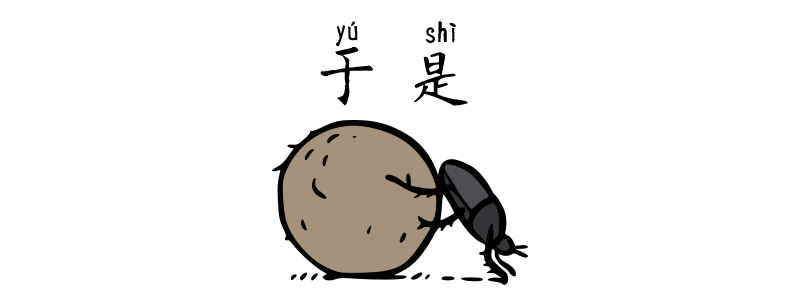Grammar Point:
The Chinese conjunction 于是 yúshì is used to indicate a sequence of events, where the second event is a direct result or natural consequence of the first one. It is similar to “and then,” “therefore,” or “as a result” in English.
Structure
Event A + 於是/于是 yúshì + Event B
It shows a cause-and-effect relationship without strictly following a timeline, focusing more on the logical flow between events. Since it’s only used to talk about the past, it’s often found in storytelling.
他交了個中國女朋友,於是開始學起中文了他交了个中国女朋友,于是开始学起中文了
He got a Chinese girlfriend, so he started learning Chinese.
他無法靠自己學好中文,於是找了一位老師教他他无法靠自己学好中文,于是找了一位老师教他
He couldn’t master Chinese on his own, so he hired a teacher.
可是後來這中國女孩要他結婚後得住在中國,於是他們就分手了可是后来这中国女孩要他结婚后得住在中国,于是他们就分手了
But then, the Chinese girl said they’d have to live in China if they got married, so they broke up.
老闆對我們的提案都不滿意,於是我們加了班重做一份提案老板对我们的提案都不满意,于是我们加了班重做一份提案
The boss wasn’t happy with any of our proposals, so we worked overtime to create a new one.
你還不知道吧?上個月他和老闆鬧翻了,於是離開了公司你还不知道吧?上个月他和老板闹翻了,于是离开了公司
You probably haven’t heard, but he had a big argument with the boss last month and quit.
FYI
闹翻 nàofān is a Chinese term that describes having a huge falling out or a major argument with someone, often leading to a serious rift or the end of the relationship. It’s the kind of conflict that totally disrupts or breaks a bond—sort of like the ever-so-friendly relationship between China and Taiwan…🫥
客戶都很喜歡他,於是一聽到他離職都和我們公司解約了客户都很喜欢他,于是一听到他离职都和我们公司解约了
His clients loved him, so when they found out he left, they all canceled their contracts with us.
Differences
所以 suǒyǐ & 于是 yúshì
- 所以 suǒyǐ can only be placed before the subject and verb. 于是 yúshì can be used before the subject and verb or in the middle.
為了找工作,他於是開始學起中文为了找工作,他于是开始学起中文 ✅
To find a job, he started learning Chinese.
為了找工作,所以他開始學起中文为了找工作,所以他开始学起中文 ✅
To find a job, he started learning Chinese.
為了找工作,他所以開始學起中文为了找工作,他所以开始学起中文 ❌
To find a job, he started learning Chinese.
- 所以 suǒyǐ is used for cause-and-effect sentences. 于是 yúshì connects actions or situations. It can show (1) events happening one after the other or (2) extend a situation, similar to words like “next” or “then.”
我今天去公園,所以帶了球我今天去公园,所以带了球 ✅
I went to the park today, so I brought a ball.
我今天去公園,於是帶了球我今天去公园,于是带了球 ❌
I went to the park today, so I brought a ball.
- 所以 suǒyǐ can be used to express commands, questions, or rhetorical statements. 于是 yúshì is only used for objective statements based on facts.
因為我沒去你家,所以你生氣了嗎?因为我没去你家,所以你生气了吗? ✅
Is it because I didn’t go to your house that you’re upset?
因為我沒去你家,於是你生氣了嗎?因为我没去你家,于是你生气了吗? ❌
Is it because I didn’t go to your house that you’re upset?


